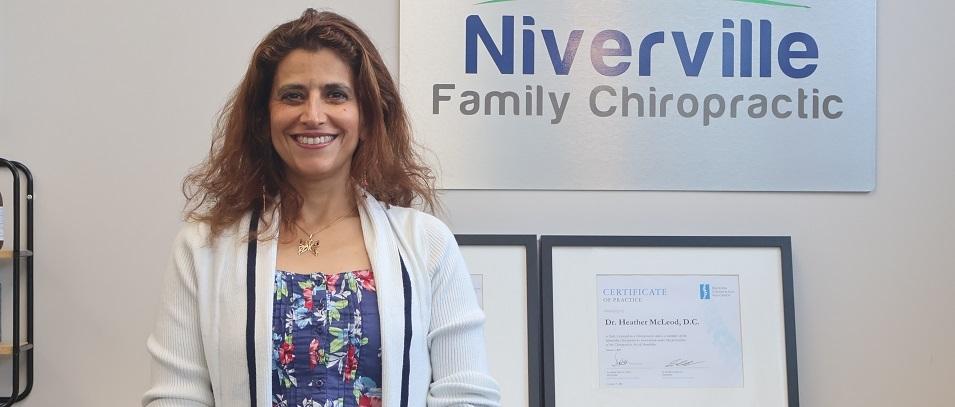A new naturopath and acupuncture specialist will soon be taking patients in Niverville. Starting in early September, Azza ElBakry will practice from the Niverville Family Chiropractic clinic at least one day per week.
ElBakry currently operates from two other locations, including Via Natural Medicine in St. Boniface as well as her home in south Winnipeg. She and her husband, Khaled Zohni, moved to Montreal from Egypt in 2007 to allow Zohni to pursue his PhD in gynaecology.
ElBakry was practicing as a conventional medical doctor at the time, with a specialty in parasitology. She found employment at McGill University’s malaria lab, where she trained lab technologists and members of the Canadian army.
Upon completion of his degree, Zohni began a fellowship in Toronto and ElBakry followed him there. It was here that she decided to shift her medical trajectory.
“I worked for years and years in public health, and at some point you just feel like maybe there is something else waiting,” ElBakry says. “I wanted to explore what’s out there and then I discovered the beautiful program at the Canadian College of Naturopathic Medicine.”
Two years later, with her new certifications in naturopathy and acupuncture, ElBakry joined her family in Winnipeg where Zohni was now working in the field of reproduction at the Heartland Fertility Clinic.
“I practice a very interesting method of acupuncture called Balanced Method,” says ElBakry. “It actually gives quick results and I find a lot of benefits with that method. At the same time, I still do practice the traditional method in addition to naturopathic medicine.”
Her desire to take her practice outside city limits first led her to Winkler, where she says the residents were exceptionally open to alternative medical practices.
Unfortunately, after 18 months, she determined that the commute was unsustainable.
One of her clients, who hailed from Niverville, told her about the growing community and she drove herself out to have a firsthand look.
“When I came I thought, ‘This is a very nice place,’ and I fell in love,” she says. “The people are amazing. That’s number one. Number two is that the drive is sustainable.”
ElBakry is fluent in English, Arabic, and French, which will go a long way as she serves patients in an increasingly multicultural region.
Determined to start small while she builds a clientele, the clinic room at Niverville Family Chiropractic will meet her needs for now. If all goes well, ElBakry hopes to eventually expand her practice to a larger space and offer more appointments.
If that should happen, she’ll look to add IV therapy.
“We use intravenous therapy for different things like cancer, with high-dose vitamin C,” ElBakry says. “We also do glutathione. It’s an antioxidant for autoimmune diseases and things like that.”
Trained in both conventional medicine and naturopathy, ElBakry believes that the two can and should be viewed as complementary. She has made a commitment to try, whenever possible, to work together with family doctors.
Because of her background, she understands medications and recognizes the conventional ways of doing things.
“In naturopathic medicine, you have to be willing to do the work,” says ElBakry. “If you are willing, naturopathic medicine is for you. There are people who are not willing. They want to live their lives the way they want—and for those people, conventional medicine is for them.”
By work, ElBakry explains that her treatment may require big changes, including dietary ones, but also lifestyle changes to reduce stress, encourage activity, and develop mindfulness.
Where people are willing to be patient and do the work, ElBakry says that she’s seen amazing results. In many cases, alongside a family doctor, she’s managed to reduce a patient’s dependency on pharmaceuticals.
Some may suffer from high blood pressure or diabetes, while others have chronic fatigue or debilitating depression. When people take charge of their health and see results, she says, it affects every part of their life in positive ways.
“Sometimes I feel like I need to take a before and after [photo],” ElBakry says. “You can see the difference in every detail of their life, and I love it.”
ElBakry explains that part of the problem with western medicine today, despite its incredible advancements in diagnostics and treatments, is that it is responsible for looking at the human body as a variety of independently functioning components. Practitioners can lose sight of how the proper function of each part affects the whole.
“In naturopathic medicine, the person is a whole,” she says. “We don’t treat the patient as a disease. If you have one organ that is suffering, all the organs are suffering. So when the person improves, they improve on every level.”
Taking that one step further, naturopathic medicine recognizes that the mind and spirit, along with the body, make up the human triad.
Most people today, she says, are not experiencing harmony between the three. And they’ve forgotten about the body’s innate ability to heal itself if given the right tools.
Even as a conventional medical practitioner, Zohni is a firm believer in the important role that naturopathy can play in the human condition. He looks forward to a day when conventional and naturopathic practitioners regularly work side by side towards the same goal: healing the patient.
The encouragement to do so, he says, may need to come from the patient.
“It’s so sad that we are kind of standing on different sides of this river while we should be saving [the drowning patient] together,” Zohni says. “It’s very important to team up for the sake of the patient because each one of us can add something to their care. [After all], we don’t want them to be a patient anymore.”
FOR MORE INFORMATION
To learn more, visit: https://naturecure-clinic.jane…


